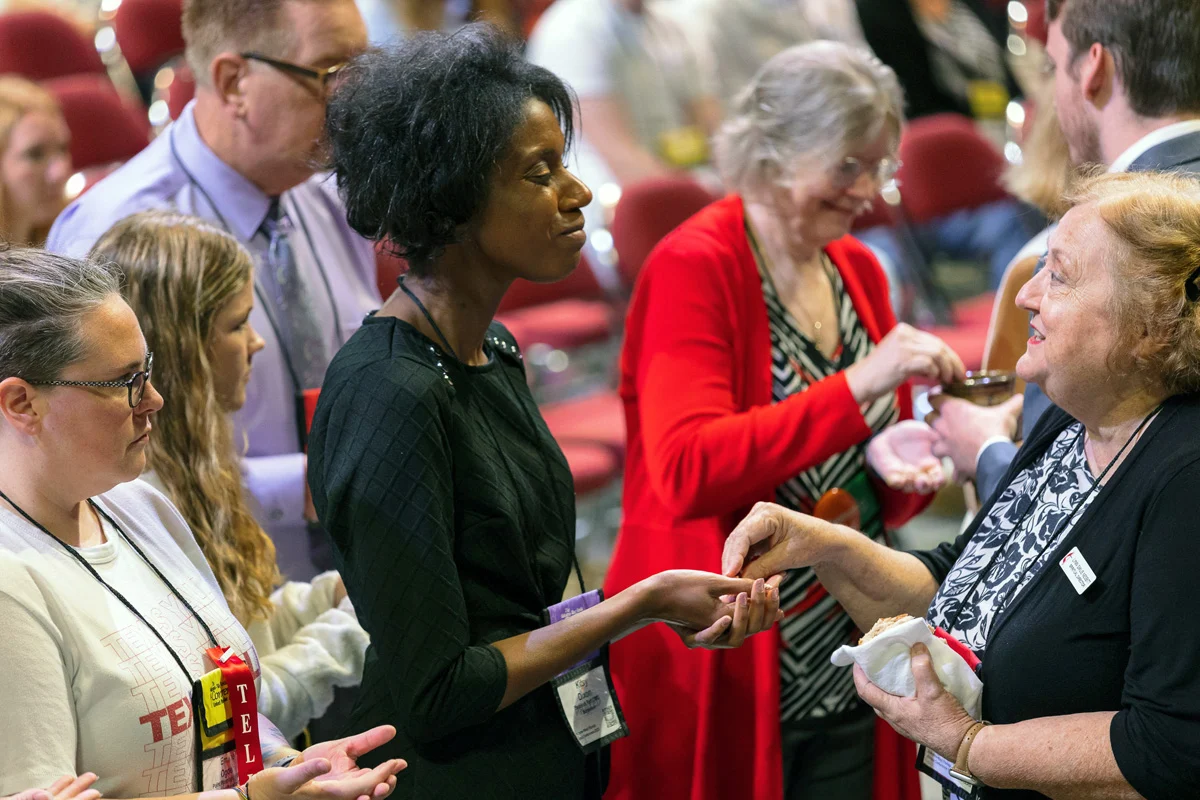This is going to be a long post with a lot to say, so I hope you’ll stay with me because it’s important.
At this moment, my heart hurts for our church as we figure out what “tomorrow” looks like for us.
We have to move on to find peace and be able to share the joy of Christ again. For some, that might have to take place at another church somewhere else.
But for those of us that are remaining members at Riverchase UMC, we have work to do to heal and chart a course for carrying out our mission.
There are some key things that I feel we must consider if we’re going to start the process of unification and showing love and respect for one another again.
We Need a Process to Let Healing Begin
We can’t ignore that there’s still a divide and we need leadership that will help us pass through that and figure out how to best navigate it.
As of this writing, the congregation has still not seen words of hope or healing from our church after what was probably the most impactful and emotional decision our church body has made since we were founded.
While there were plans underway to handle disaffiliation and a transition team and all of those necessary logistics, there doesn’t seem to have been a plan – regardless of the outcome of the vote – to heal.
Do we need listening sessions or a “Healing Team” or something to move us to the next phase of our church? It’s going to be hard to just “go back to normal” like nothing just happened and we never saw the voting results. Maybe it’s a Christian consultancy firm or something from the denomination.
If we just try to “put things in the past and move on”, that really just diminishes the hurt that many are feeling. We can’t do that if we want to all stick together.
Let’s put God at the center of our healing and give our future over to Him.
We Should Each Make Sure We Truly Align with United Methodism
When someone asks what denomination you’re a member of, can you say you’re a United Methodist with pride?
Okay, admittedly, it can be hard on occasion.
At the 2019 General Conference in St. Louis, LGTBQ+ legislation kept getting amended and the whole gathering was up against a 6:30 pm time limit to vacate the America’s Center Convention Complex because…there was a monster truck rally that had to start loading in. Probably not one of our finer moments for sure as we debated legislation while “Grave Digger” was being wheeled in.
So do you believe in the institution we call ‘United Methodism’? I’m not talking about being 100% satisfied with it.
When you buy an older house that has “good bones”, you probably understand you’ll have an ongoing process of modernizing it and bringing it up to current standards. But you also know that its framing and structure are sound and can take some additions and improvements.
That’s the same with the United Methodist Church and likely most denominations – they evolve over time.
So each of us should ask ourselves:
Can I handle being in a denomination where we value sharing fundamental beliefs while allowing churches to do things differently than our church and doing them for the sake of reaching people that ours can’t?
If the answer is “no”, then United Methodism might not be the denomination where you can truly let your spiritual gifts thrive. And this is so very important for kingdom work.
We also have to resist being fearful because United Methodism might look slightly different in one part of the country or world than ours.
I’ve mentioned it before, but Riverchase UMC is a hodgepodge of members cobbled together from a variety of denominations. This sometimes makes it challenging as everyone has unique perspectives from across the theological spectrum. But it can also be a huge asset because the tapestry of viewpoints brings a diversity of thought.
But we – as members of Riverchase UMC – now have to be behind the United Methodist Church’s future as the framework that is going to help us do our work here in Riverchase and beyond.
Our Future Will Be One of Respect and Inclusion
On June 23rd at the 2023 UMC North Alabama Annual Conference, the delegates representing the conference voted by a margin of 236 to 151 to support a resolution with the following statement in it:
The voting members of the North Alabama Annual Conference support the removal of all language pertaining to homosexuality from the Book of Discipline by the next General Conference.
Important to note in the language of the resolution – just after the above statement – is the following:
We affirm a continuing commitment to honor the conscience and convictions of our individual churches and clergy, along the theological spectrum, in the appointment process….
So what does all this mean?
The Conference has committed to do two things simultaneously – advocate for the removal of the harmful language in the Book of Discipline while respecting the fact that some congregations are worried that they will get assigned a gay pastor.
Now keep in mind that our Conference doesn’t control what’s in the Book of Discipline. They can’t change anything about it. That’s for the larger General Conference that will meet in 2024 and does so every few years.
But both of these points should reveal something to all of us as we move on from Monday night: our Conference delegates are trying to show a way forward to a more inclusive church. Still, the Conference has also committed to respecting the conviction concerns of traditional churches who are worried they are going to be assigned a gay pastor.
Passing this resolution at the North Alabama Conference level allows us the space as churches to be assured that our Bishop and leadership are not going to put pastors in our churches that do not align with our congregations, while also pushing to remove language in the Book of Discipline that has divided our churches.
We Should Seek Out Committed Leaders
On Wednesday of this week, notes were sent out to the members of various committees and the Board of Stewards to find out who was going to be leaving the church and therefore would be leaving a leadership position vacant.
It’s going to be essential for the leaders of our church – both pastoral and lay leaders – to be committed to furthering our church as a United Methodist Church going forward.
We are a blended church of perspectives and we must ensure that all perspectives are represented and are appreciated.
Each of us should understand the common, shared vision of the future of the church, and our pastoral and lay leadership duties require a solid commitment to initiatives that help drive us toward that vision.
It will be harmful to our church’s future if we have leaders advocating for anything that leads us away from United Methodism.
If we have current leadership who still – after this past Monday – cannot lead us in lockstep with United Methodism, then we must respect those desires and ask new, committed leaders to step in.
We need people who want to be a) members of our church, and b) United Methodists.
Let’s start at the top and make sure that everyone’s in.
We Must Move with Our Denomination
United Methodism has been a denomination of the theological middle in a world with ever-increasing extremes. Our collective convictions are what have allowed us to thrive globally.
Individually, having a conviction about an issue is one thing. Acting on those beliefs in a way that is detrimental to a church and the denomination it is a member of is another.
We can’t be a United Methodist Church that is swimming upstream from the rest of the denomination. We can’t be actively doing things in our church that don’t align with the direction in which it’s clearly headed.
Our individual efforts, and those collectively of our church, should not create friction between our church and that of the Conference or the UMC.
Let’s ensure that our efforts don’t run counter to our denomination’s.
Let Our Board Show Support for a New Day for the Church
Some of what has caused uneasiness for the past several years for our congregation has been the “not knowing”.
Not knowing what decisions the UMC would make. Not knowing what decisions the UMC North Alabama Conference would make or what rules they’d enforce or not. Not knowing what pastor we’d get next and what they’d be like. Not knowing what direction our church would be going in.
But there has also been the unsettled state of “knowing….then suddenly not knowing again”.
In October of last year, we thought we wouldn’t discern. The Board of Stewards voted not to. We thought we had moved on.
Then, we got a new class of Board of Stewards members coming in in January of this year and then coincidentally we needed to “revote” on entering the discernment process.
So with Monday’s vote behind us now, I’m asking our Board of Stewards as the combined pastoral, staff, and lay leadership body of our church to consider some things that might help put the congregation at ease.
Maybe we pass a resolution at a board meeting to not entertain disaffiliation for some period of time. Show the congregation that we’re committed as leaders to really put this in the past and let the church heal.
And let’s consider making our board votes about the future of our church unanimous. We should be all in or out together.
Our church needs to be assured that this church will not be distracted by further conversations of splitting or upheaval.
A statement from our Board establishing trust and instilling hope for calm waters for our church might just bring us beyond the storms we’ve weathered.
We Need to Be a Church That is Real About Its Acceptance of Others… and Clearly States It
As humans, we’re meant to find enlightenment as our curiosity lets us learn more about who we are as God’s children and how our behaviors should evolve to love one another more like Christ did with us.
That’s not being “woke”, “bending to society”, “not being Biblical” or any of the other labels that honestly feel like personal insecurities masked by words.
We were never meant to be socially stuck forever in one time period. God has been there through all of our society’s falls and successes alike.
It’s time to focus on real, unconditional acceptance.
We need to encourage witness and action for a more just, loving and peaceful world.
We need to clearly communicate the kind of church we’re going to be, bringing others in to go back out into the world and make disciples.
Each of us needs to be the change that makes us a spiritual greenhouse.
And that means making every “seedling” feel fully welcomed, not just in empty sentiments of “we welcome everyone”, but rather in the vein of “we welcome everyone and will lead efforts to advocate for you to be seen as an equal in society’s eyes because we love you”.
This is probably a great time to update our “About Our Beliefs” page on our website. Make it clear that we are a United Methodist Church pointed toward a more inclusive spiritual experience.
We Should Take This Moment to Be Introspective as a Church
What things are we doing that we shouldn’t be?
Where should we be focusing that we aren’t?
What do we keep doing because we do them well? Maybe we “double-down” on the things that are working best?
Let’s take this moment in time to help create the best environment in which hearts can be changed.
Let’s Value the Power of Our Differences
I don’t wish anyone the feeling of sitting in a worship service feeling disconnected because they wanted a different future for our church.
And I don’t want any fellow member to feel like because they have a different opinion that they aren’t welcome.
To borrow a phrase from the website of our local sister church, Trinity UMC, there’s value in “unity without uniformity”.
For years, we’ve all worshipped together and we come from a variety of places on the ideological spectrum.
We were all able to worship together until The One Issue entered the room.
For some, it was a big issue, enough to divide a church. For others, it was a non-issue.
We should be able to sit and worship together and do mission work together and have communion together and also have constructive dialogue about how we each interpret scripture.
That’s a very, very Wesleyan thing to do. We talk about scripture and what God’s telling us through it. We’re the denomination that questions and discusses in our small groups. Iron sharpens iron. We get deeper in our faith by asking questions of one another.
We’re strong because of our differences, not in spite of them.
We Should Really Get to Know One Another Again
We’re a really big church. And at times it’s easy for us to get stuck in “cliques” in our own little bubbles of our friends and not get to know anyone else.
Small churches have the luxury of connectional worship that we don’t get to experience enough. Everyone has to pitch in and do everything. You have to all work together because you’re the only one to make the church function.
But for big churches, it takes more intentionality to connect with people outside of your social circles.
And this is especially true when it comes to people who may have a different perspective on issues than you do.
Here’s a moment of honesty and regret.
I regret over the past several years that I didn’t stay closer to former RUMC member, David Allen.
I met David unexpectedly when our church built the Music Ministry addition along with the upper parking lot near it.
One Sunday arriving for the 11 o’clock service, I noticed some folks gathered around a Ford pickup that was in the still-incomplete upper parking lot. David had gotten his pickup axle stuck on a new curb up there.
For maybe 30 minutes, several of us wedged all kinds of random construction stuff on the property under the rear wheels of his truck to free it. David stood and watched and “gave it gas” as several of us tried anything that would get his rear axle off of a new curb that had just been poured. We finally got it freed and he was on his way.
I didn’t see David much after that because we went to different church services.
But one day during my Board of Stewards chair tenure, David invited me and a couple of other leaders into his home to talk about some conflict in the church and how to resolve it. During that meeting, David and I realized that had met a year or two before in the parking lot as we freed his truck.
Four of us sat around the Allens’ glass-top table. We had sweet tea. There were even some tears that our church was slowly fracturing. We didn’t have the solutions, but there were some steps taken to resolve a brewing conflict that would have its finality this past Monday.
And while we share a love for Christ, David and I probably sit in different places from one another on the ideological spectrum in a few ways. He knows that. I know that.
After that day, I really didn’t do much else to bridge the gap. To keep talking. To listen to another perspective or offer mine in return.
That’s a regret.
Because David and his family are now members of Christ Church. After 37 years at Riverchase UMC, they moved churches as the conflict swelled.
But, we should have done more to keep connected and to talk and listen to one another, because he was someone with alternative points of view that could talk through them rationally with me.
We need more talking. We need more honesty with one another. We need to be able to say what we think about our beliefs individually and not get bucketed into a “side” of the issue.
There should be less commentary about how people have sex and more about how we can best go make disciples – together.
Should we have multi-generational dinners where we have to sit with someone of a different age or Sunday School group? Do we have small group dinners that we’re randomly assigned to and rotate occasionally?
David and I were at the same church for at least about 23 years. There’s no reason that two people at a church together that long shouldn’t be encountering each other more. It took conflict in the church and a parking lot curb for us to have shared experiences.
Let’s get creative and figure out how we get to know one another again with God as the center of our relationships and seeing one another as partners in our work, not adversaries.
The Takeaway
Monday’s disaffiliation vote experience was one that I hope I never have to go through again with a church.
But it is a new day. It’s a new moment for us. God’s got us and we should feel hope and rejoice in that. His love is enduring and He’s been there as we’ve weathered storms throughout the centuries.
In this moment, we need to go onward together. Go forward.
It’s time to be Riverchase United…again.






